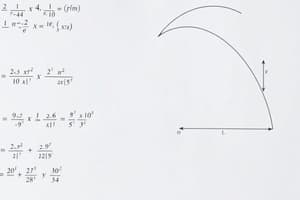Podcast
Questions and Answers
What determines the direction in which a parabola opens?
What determines the direction in which a parabola opens?
- The value of the coefficient b
- The vertex of the parabola
- The value of the constant c
- The sign of the coefficient a (correct)
Which equation represents the axis of symmetry for a parabola?
Which equation represents the axis of symmetry for a parabola?
- x = rac{b}{2a}
- x = - rac{b}{2a} (correct)
- y = - rac{b}{2a}
- y = rac{b}{2a}
How can the vertex of a parabola be calculated?
How can the vertex of a parabola be calculated?
- By finding the midpoint of the focus and directrix
- From the equation of the axis of symmetry
- By averaging the x-values of the endpoints of the latus rectum
- Using the formula x = - rac{b}{2a} and substituting back into the function (correct)
What identifies a parabola apart from a general quadratic equation?
What identifies a parabola apart from a general quadratic equation?
What is the length of the latus rectum for a parabola where the distance from the vertex to the focus is p?
What is the length of the latus rectum for a parabola where the distance from the vertex to the focus is p?
Which of the following is true regarding horizontal parabolas?
Which of the following is true regarding horizontal parabolas?
In which application would parabolas NOT typically be used?
In which application would parabolas NOT typically be used?
What can be determined by plotting additional points around the vertex when graphing a parabola?
What can be determined by plotting additional points around the vertex when graphing a parabola?
Flashcards are hidden until you start studying
Study Notes
Parabula
-
Definition: A parabula is a symmetrical, U-shaped curve that represents a quadratic function in the Cartesian coordinate system.
-
Standard Form: The equation of a parabola can be expressed in standard form as:
- ( y = ax^2 + bx + c )
- Where ( a ), ( b ), and ( c ) are constants.
- The sign of ( a ) determines the direction of the parabola (upward if ( a > 0 ), downward if ( a < 0 )).
- ( y = ax^2 + bx + c )
-
Vertex:
- The highest or lowest point of the parabola, depending on its orientation.
- Can be calculated using the formula:
- ( x = -\frac{b}{2a} )
- The corresponding ( y ) value can be found by substituting ( x ) back into the equation.
-
Axis of Symmetry:
- A vertical line that divides the parabola into two mirror-image halves.
- Given by the equation ( x = -\frac{b}{2a} ).
-
Focus and Directrix:
- A parabola can be defined geometrically as the set of points equidistant from a point called the focus and a line called the directrix.
- The focus is located at ( (h, k + p) ) and the directrix is given by the line ( y = k - p ) for parabolas that open upwards.
-
Latus Rectum:
- A line segment perpendicular to the axis of symmetry that passes through the focus, with endpoints on the parabola.
- The length of the latus rectum is ( |4p| ), where ( p ) is the distance from the vertex to the focus.
-
Types of Parabolas:
- Vertical Parabolas: Open upwards or downwards.
- Horizontal Parabolas: Open to the left or right, expressed in the form ( x = ay^2 + by + c ).
-
Applications:
- Used in physics (projectile motion), engineering (reflecting telescopes, satellite dishes), and architecture (parabolic arches).
-
Graphing Tips:
- Identify the vertex and axis of symmetry.
- Determine the direction of opening (using the coefficient ( a )).
- Plot additional points by choosing x-values around the vertex for a more accurate graph.
-
Key Points:
- Symmetry about the axis.
- Relationship between the focus, directrix, and points on the parabola.
- Important for quadratic equations and their graphical representation.
Definition and Characteristics
- A parabola is a symmetrical, U-shaped curve representing quadratic functions in the Cartesian plane.
- The standard form of a parabola's equation is: ( y = ax^2 + bx + c ), where ( a ), ( b ), and ( c ) are constants.
- The sign of the coefficient ( a ) indicates the parabola's direction: upward if ( a > 0 ) and downward if ( a < 0 ).
Vertex and Axis of Symmetry
- The vertex is the highest or lowest point of the parabola, determined by the formula ( x = -\frac{b}{2a} ).
- The corresponding ( y )-value can be calculated by substituting the vertex's ( x ) back into the parabola's equation.
- The axis of symmetry is a vertical line that splits the parabola into two identical halves, expressed as ( x = -\frac{b}{2a} ).
Focus and Directrix
- A parabola can be defined as the set of points equidistant from a focus point and a directrix line.
- For upward-opening parabolas, the focus is at ( (h, k + p) ) and the directrix is represented by ( y = k - p ).
Latus Rectum
- The latus rectum is a line segment perpendicular to the axis of symmetry that intersects the focus, extending to the parabola.
- Its length is given by ( |4p| ), where ( p ) is the distance from the vertex to the focus.
Types of Parabolas
- Vertical Parabolas: Can open upward or downward.
- Horizontal Parabolas: Open to the left or right, typically expressed as ( x = ay^2 + by + c ).
Applications
- Parabolas are significant in various fields:
- Physics: Modeling projectile motion.
- Engineering: Used in reflecting telescopes and satellite dishes.
- Architecture: Found in designs of parabolic arches.
Graphing Tips
- To graph a parabola:
- Identify the vertex and axis of symmetry.
- Establish the direction of opening based on the coefficient ( a ).
- Plot additional points by selecting ( x )-values around the vertex for a more accurate representation.
Key Points
- Parabolas exhibit symmetry around their axis of symmetry.
- The relationship between the focus, directrix, and points on the parabola is crucial for understanding its properties.
- Essential for solving quadratic equations and their visual representation on graphs.
Studying That Suits You
Use AI to generate personalized quizzes and flashcards to suit your learning preferences.




